What is a Lottery?

A lottery is a type of gambling game in which people buy numbered tickets. Some of the tickets are then chosen at random, and the people who have those numbers on their tickets win a prize. A lottery is often used to raise money for a public service, such as education or infrastructure. It can also be used to give away items of considerable value, such as sports teams or cars. In the United States, state governments operate lotteries to generate revenue and award prizes. The National Basketball Association also holds a lottery to select its draft picks each year.
While casting lots for decisions and fates has a long history, the use of a lottery for material gain is relatively recent. The earliest known public lottery was held by Augustus Caesar to fund city repairs in Rome. The first lottery to distribute cash prizes was conducted in Bruges, Belgium in 1466. The name lottery comes from the Middle Dutch word loterie, which may be a calque of Old French loterie, itself a calque of Latin lotio, the action of drawing lots.
Although most people who play the lottery have an insatiable desire to become rich, most also know that the chances of winning are slim to none. But despite this knowledge, the lottery continues to attract millions of players every year. In fact, Americans spend over $80 billion on lottery tickets each year. This is money that could be better spent building an emergency savings account or paying down credit card debt.
There are a few key factors that contribute to the popularity of the lottery. One is that people enjoy the experience of buying and scratching a ticket. The other is that the lottery is marketed as a way to fund public services, which appeals to many people’s sense of altruism. However, this is a misleading message that obscures the lottery’s regressive nature.
The lottery is a form of risky behavior that can lead to financial ruin. It’s important to understand how the odds work before playing so that you can maximize your chances of winning. There are several ways to improve your odds of winning, including selecting fewer numbers or using a hot and cold strategy. In addition, it’s a good idea to play responsibly and only within your budget.
While it’s true that the monetary gains from winning the lottery are small, there is still an entertainment value to it. For some individuals, the utility of this enjoyment will outweigh the disutility of a monetary loss. The fact that the lottery is a risky activity is not enough to deter people from playing, especially when it’s advertised so heavily.